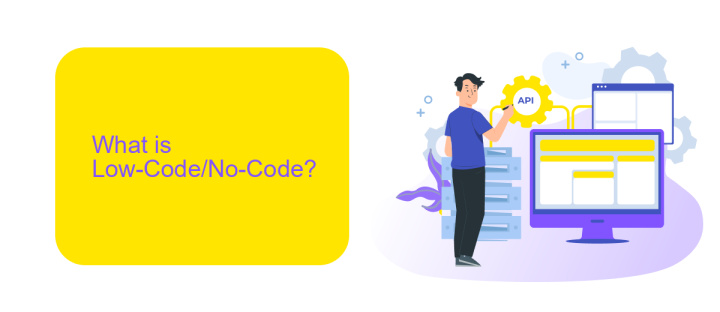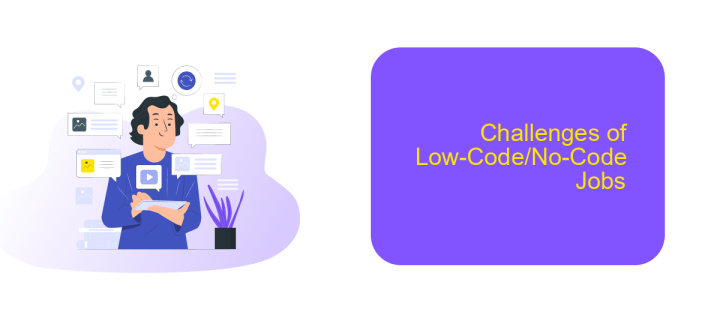Low-Code No-Code Jobs
The rise of Low-Code No-Code (LCNC) platforms is revolutionizing the tech industry, offering unprecedented opportunities for individuals and businesses alike. These platforms enable users to create applications with minimal programming knowledge, democratizing software development. As demand for LCNC solutions grows, so does the need for skilled professionals who can leverage these tools to drive innovation and efficiency.
Introduction
The rise of low-code and no-code platforms has revolutionized the way businesses approach software development. These platforms enable individuals with little to no programming experience to create applications and automate workflows, significantly reducing the time and cost associated with traditional development methods. As a result, a new category of jobs has emerged, catering to the growing demand for professionals skilled in these technologies.
- Streamlined application development processes
- Cost-effective solutions for businesses
- Increased accessibility for non-technical users
- Enhanced collaboration between IT and business teams
One notable example of a tool that supports low-code and no-code integration is ApiX-Drive. This service allows users to seamlessly connect various applications and automate data transfers without the need for extensive coding knowledge. By leveraging such platforms, businesses can optimize their operations and stay competitive in a rapidly evolving digital landscape.
What is Low-Code/No-Code?

Low-code and no-code platforms are revolutionizing the way applications are developed by allowing users to create software solutions with minimal hand-coding. These platforms provide visual development environments where users can drag and drop components to build applications, significantly reducing the time and technical expertise required. Low-code platforms still require some coding knowledge, whereas no-code platforms are designed for users with little to no programming experience, making them accessible to a broader audience, including business analysts and project managers.
One of the key advantages of low-code/no-code platforms is their ability to integrate with various services and systems seamlessly. For instance, ApiX-Drive is a powerful tool that helps users connect different applications and automate workflows without needing to write complex code. By using ApiX-Drive, businesses can streamline their processes, improve productivity, and reduce the risk of human error. This democratization of software development allows organizations to innovate faster and respond more agilely to market demands.
Benefits of Low-Code/No-Code Jobs

Low-code and no-code jobs offer numerous advantages that make them highly appealing in today's fast-paced tech environment. These roles are designed to empower individuals with minimal coding skills to create applications and automate processes efficiently.
- Accessibility: These jobs open up opportunities for a broader range of people, including those without a traditional computer science background.
- Speed: Development times are significantly reduced, allowing for quicker deployment of applications and solutions.
- Cost-Effective: Companies can save on hiring specialized developers, reducing overall project costs.
- Flexibility: Tools like ApiX-Drive facilitate seamless integration of various services, enabling businesses to adapt quickly to changing needs.
- Innovation: By lowering the entry barrier, more creative solutions can emerge from diverse teams.
Ultimately, low-code and no-code jobs are transforming the tech landscape by democratizing software development. With platforms like ApiX-Drive, businesses can easily integrate multiple services, further enhancing productivity and innovation. This shift not only accelerates project timelines but also fosters a more inclusive and dynamic workforce.
Challenges of Low-Code/No-Code Jobs

Low-code and no-code jobs present unique challenges, despite their promise of simplifying development processes. One of the primary issues is the limited customization options. While these platforms offer a range of pre-built templates and functionalities, they often fall short when it comes to addressing specific, complex business needs.
Another significant challenge is the dependency on the platform's ecosystem. Companies may find themselves locked into a particular vendor, making it difficult to switch platforms without substantial time and cost investments. This can be particularly problematic if the platform fails to evolve with the company’s growing requirements.
- Limited customization capabilities
- Vendor lock-in issues
- Scalability concerns
- Security and compliance risks
Integrating low-code/no-code solutions with existing systems can also be challenging. However, services like ApiX-Drive can help streamline these integrations by providing automated workflows and data synchronization between different platforms. This reduces the technical burden and allows teams to focus on more strategic tasks. Despite these challenges, with the right tools and strategies, low-code/no-code jobs can still offer significant benefits to businesses.


Conclusion
The rise of Low-Code and No-Code platforms has significantly transformed the job market, offering new opportunities for individuals with varying technical skills. These platforms empower users to create and deploy applications quickly without the need for extensive coding knowledge, thereby democratizing software development. This shift not only enhances productivity but also enables businesses to innovate faster and respond more swiftly to market demands.
Moreover, the integration capabilities of these platforms, exemplified by services like ApiX-Drive, further streamline workflows by connecting disparate systems effortlessly. ApiX-Drive, for instance, allows users to set up integrations with minimal effort, ensuring that data flows seamlessly across various applications. This integration ease is crucial for businesses aiming to maintain agility and efficiency. As Low-Code and No-Code solutions continue to evolve, they will undoubtedly play a pivotal role in shaping the future of work, making technology more accessible and inclusive.
FAQ
What is Low-Code/No-Code development?
What types of jobs are available in the Low-Code/No-Code field?
Do I need a technical background to work in Low-Code/No-Code jobs?
How can Low-Code/No-Code platforms be used for automation and integrations?
What skills are important for a career in Low-Code/No-Code development?
Strive to take your business to the next level, achieve your goals faster and more efficiently? Apix-Drive is your reliable assistant for these tasks. An online service and application connector will help you automate key business processes and get rid of the routine. You and your employees will free up time for important core tasks. Try Apix-Drive features for free to see the effectiveness of the online connector for yourself.

